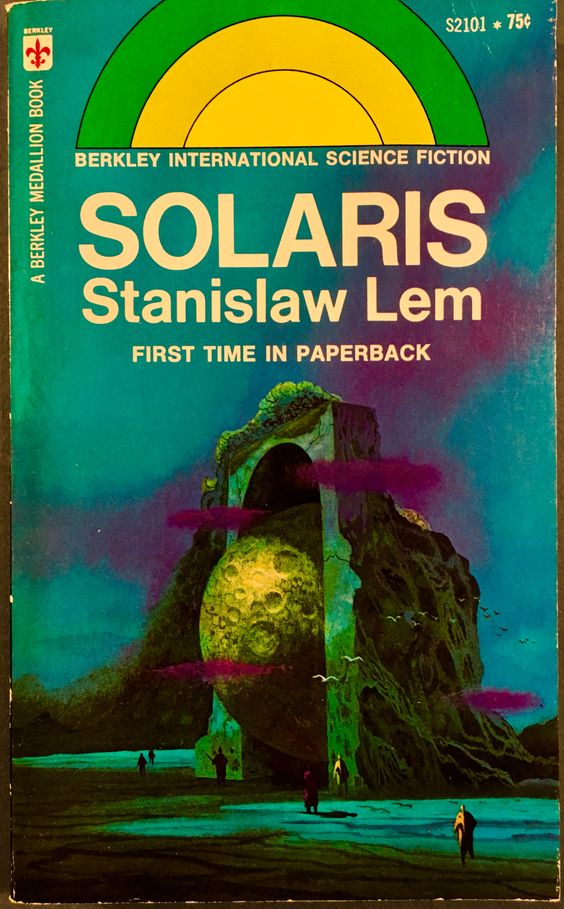One in a series of posts dedicated to the author’s favorite semiopunk sci-fi. A version of each installment in this series first appeared at our sister site, HILOBROW.
From Earth, psychologist Kris Kelvin arrives at a scientific research station hovering near the gelatinous surface of the planet Solaris. The Solarian Ocean appears to be an organism, constantly in flux, that brings forth massive outcroppings, mountains, flower-like structures, even city-like formations. For decades, a team of scientists has studied Solaris’s complex wave motions, but they haven’t been able to determine what these activities may signify.
Shortly before Kelvin’s arrival, the scientists have begun bombarding the ocean with high-energy x-rays. As a result of this experiment, maybe, the station crew’s most painful and repressed thoughts and memories are actualized. Each member of the crew is visited by a lifelike simulacrum. (Kelvin, for example, who feels guilty about the suicide of his lover, meets her again.) The horrified scientists can’t bring themselves to discuss what any of this might mean; their instinctive — unscientific — reaction is instead to destroy the simulacra.
The book’s plot, however, isn’t really what Solaris (1961) is about. “I only wanted to create a vision of a human encounter with something that certainly exists, in a mighty manner perhaps,” Lem says in a 2002 interview, “but cannot be reduced to human concepts, ideas or images.” Solaris is about the limitations of the tools that we employ for making sense.
Kelvin is a scientist’s scientist: stoic and collected, at times even cold… which doesn’t help him to comprehend Solaris. The only thing the inductive “solarists” can do, despite their impressive theories, arguments, encyclopedias, research expeditions, and monographs, is pile up more data. The solarists’ ever-expanding map, if you will, obscures the territory.
In a 1989 interview, Lem would observe that “the peculiarity of those phenomena [in Solaris] seems to suggest that we observe a kind of rational activity, but the meaning of this seemingly rational activity of the Solarian Ocean is beyond the reach of human beings.”
This is a philosophical (and semiotics-informed) novel asking, What would happen if we encountered an alien intelligence so exotic that we could in no way at all comprehend it?

Lem’s novel isn’t about Solaris, so much as it is a satire about the fictional scientific discipline of Solaristics — the echo with semiotics is amusing — which fails to do much besides observing, recording, and categorizing the complex phenomena that occur on the surface of Solaris’s “ocean.”
Has something similar happened with semiotics? Did the discipline become too positivistic, at some point? Saussure and Peirce agree that human concepts, ideas, and images are merely attempts to depict and communicate that which is beyond language. My fellow commercial semioticians will agree that you can’t say this sort of thing to our clients.
Think of Peirce’s “iconic” stage — the mental representation of visual stimuli in raw, unprocessed form. “Firstness” is how we experience things, Peirce notes — there is an innocence, a lack of categorization, an overwhelming sensory input. We experience the things of the world as “vagues” — they’re fuzzy, blobby, indeterminate.
In “firstness,” perceptions flow over us as a whole — not broken into categorized and classified parts. Peirce’s student William James would call this a “blooming buzzing confusion.” We grow our knowledge of vagues — indeterminate perceptions that require further exploration — through a process that is semiotic. To be more precise, we engage in what Peirce named abductive hypothesizing — regarding vagues — because we assume that there must be some way to categorize them, to organize this experience, to make sense of it. There must be similarities that we can detect.
Knowing is never immediate and intuitive, semiotics would have us understand; it just seems that way. Knowing is a process so rapid that it feels immediate and intuitive. It feels like we’re holding a mirror up to nature, when in fact we build concepts from initially vague perceptions via a semiotic process — that is to say by using signs. We intuitively seek patterns that will help us organize these impressions and make sense.
The virtue of Lem’s novel is that it depicts the sense-making process stuck in “firstness” gear, if you will. The hypotheses generated by scientists who are perhaps not imaginative enough, not sufficiently in touch with their own neuroses and imaginations, don’t work.
Jonathan E. Hernandez, author of the Gordian Knot trilogy, has written that a reader of Solaris is left to wonder: “To what extent can any of us understand one another, or ourselves? Is true understanding even possible? What does understanding imply? What is intelligence? Does knowledge itself have inherent value or is it merely a means to an end? Will a pursuit of knowledge ever satisfy our need to understand, or is it just another ego-driven attempt at grasping the unattainable?”
Again, not questions that we can pose to our clients. But ones well worth asking.


